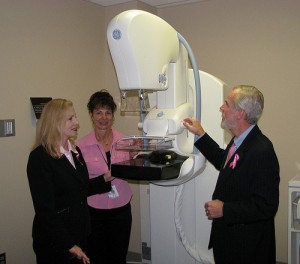Posted on 31 May 2011. Tags: 10 women, autumn, breast cancer, breast cancer screening, colleagues, controversy, preventive services, risk factors, university of massachusetts, woman health
 An opinion poll revealed that more than 8 out of 10 women perceive the new guidelines that do not recommend routine breast cancer screening for women below the age of 50 as unsafe.
An opinion poll revealed that more than 8 out of 10 women perceive the new guidelines that do not recommend routine breast cancer screening for women below the age of 50 as unsafe.
However, University of Massachusetts Medical School researchers in Worcester found out that the majority of the women gravely overestimate their risk to develop the disease.
A group of independent experts funded by the government decided to change its recommendations in late 2009. This flared up the controversy over breast cancer screening through mammography.
The U.S. Preventive Services Task Force advised that women should only get routine breast cancer screening when they reach the age of 50 and not 40. The group also recommended that women between the age of 50 and 74 should only get mammograms every other year.
But, the group did not say that no women below 50 years old should be screened for breast cancer. They said the decision would be left to the woman and her doctor, based on the individual’s risk factors and preferences. Still, the recommendations faced staunch resistance from medical and advocacy groups, as well as from news organizations.
The opinion poll was carried out by Autumn Davidson and her colleagues to find out what women really think about it. They gave answer forms to 247 women in their 40s, who also came to the hospital for their yearly well-woman health screening.
The survey showed that 8 out of 10 women felt that the new guidelines were not safe and wanted annual mammograms. They said they would not delay the screening until the age of 50.
Posted in Health
Posted on 07 March 2011. Tags: cardiovascular diseases, cardiovascular system, cholesterol levels, international diabetes federation, management of diabetes, medical insurances, proper diagnosis, risk factors, serum cholesterol, stephen lim
 A recent research study found that poor diagnosis and ineffective treatment of diabetes may place the lives of many people at greater risk for untimely death.
A recent research study found that poor diagnosis and ineffective treatment of diabetes may place the lives of many people at greater risk for untimely death.
A team of U.S. researchers conducted a study on the diagnosis, treatment and management of diabetes in several countries including Thailand, Iran, England, Iran, Scotland, Mexico and United States.
The study showed that over 16 million adults or almost 90 percent of diabetics aged 35 and older in United States have improper management of blood sugar levels, blood pressure, as well as cholesterol levels.
The researchers from Institute for Health Metrics and Evaluation at the University of Washington in Seattle also found that 99 percent of diabetic people in Mexico live with this scenario.
Other findings in the study include the low percentage rate of diabetes patients who attained the treatment goals of the International Diabetes Federation for blood glucose, serum cholesterol and blood pressure. Only 1 to 12 percent achieved it.
Diagnosis rates for diabetes were also higher in women than men. Once diagnosed with the condition, most patients do not receive further treatment for other risk factors like cardiovascular diseases that could also be harmful to their health.
It was also shown that people with medical insurances are twice likely to receive proper diagnosis and treatment for diabetes as those people without insurance.
Dr. Stephen Lim, co-author of the study and an associate professor of global health said during an IHME news release that there are too many people who are not properly diagnosed with diabetes, including other related risk factors on the cardiovascular system.
If diagnosed, patients are not also being treated properly. The professor said that it is a huge neglected chance to decrease the cases of diabetes in both poor and rich countries.
Posted in Health
 An opinion poll revealed that more than 8 out of 10 women perceive the new guidelines that do not recommend routine breast cancer screening for women below the age of 50 as unsafe.
An opinion poll revealed that more than 8 out of 10 women perceive the new guidelines that do not recommend routine breast cancer screening for women below the age of 50 as unsafe.
 A recent research study found that poor diagnosis and ineffective treatment of diabetes may place the lives of many people at greater risk for untimely death.
A recent research study found that poor diagnosis and ineffective treatment of diabetes may place the lives of many people at greater risk for untimely death.